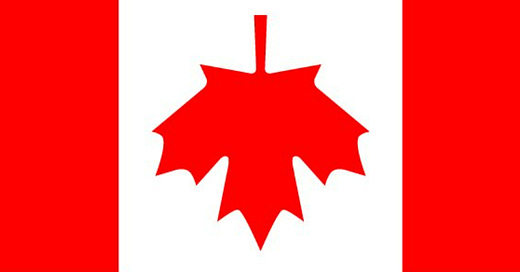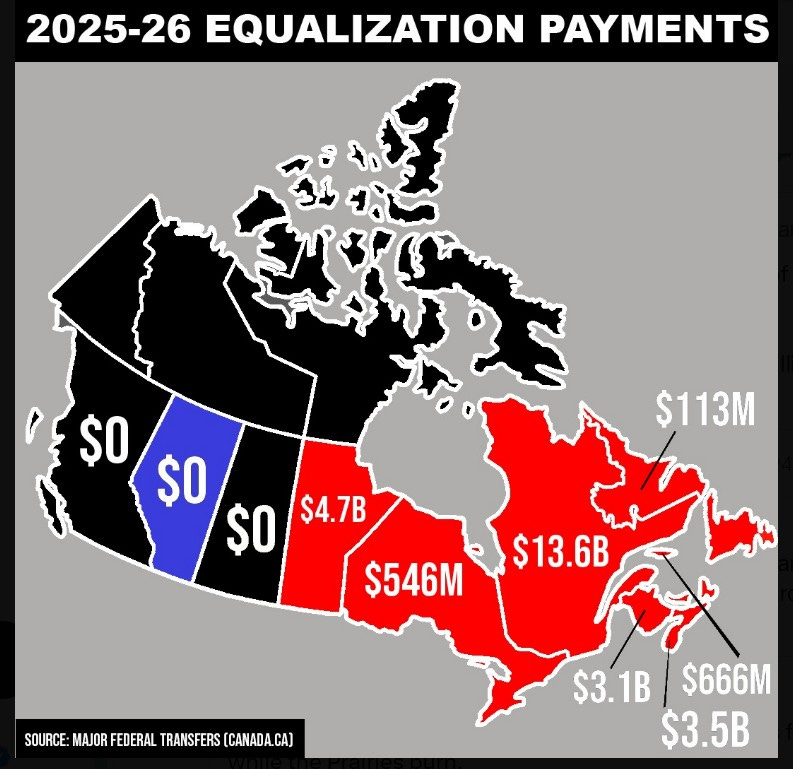Every year, billions of dollars flow from Canada’s economic powerhouses to provinces that, by design, have little incentive to stand on their own. This is the story of Canada’s equalization payments—and why they’re breaking the country.
Canada’s equalization program was designed to ensure all provinces can provide comparable public services, but in 2025-2026, it’s clear the system is broken. A map circulating online paints a stark picture: provinces like Quebec and the Maritimes, marked in red, will receive billions in transfer payments, while Alberta, in blue, foots the largest bill without receiving a cent. This isn’t just about money—it’s about incentives, fairness, and the growing anger in the West. Here’s why provincial transfer payments are doing more harm than good.
You see, it’s about incentives. The red provinces are not suffering for the economic decisions they’ve made. When you don’t suffer, there’s no incentive to change. Taking money from wealthy provinces enables this. The classic example would be Quebec, the largest benefactor of provincial payments. The Quebec premier recently said in February 2025 “there is ‘no social acceptability’ for oil and gas pipelines in Quebec,” implying limited public or political support for such projects at this time. Granted, he has recently said that if a pipeline was proposed, his government would consider it, which is a 180 from Quebec’s long stance on these policies. But that is a far cry from developing your own resources and becoming self-sufficient.
In 2025-2026, Quebec is set to receive approximately $13 billion in equalization payments, while Alberta contributes over $20 billion to federal coffers, much of which funds these transfers (Department of Finance Canada, 2025). This dynamic allows provinces to avoid tough economic choices, like Quebec’s long-standing resistance to oil and gas development.
Why would there be any ‘social acceptability’ of oil and gas development in Quebec? Quebecers keep getting handouts so why would they change?
What would happen if the handouts disappeared? The Quebec government would either need to borrow money to continue its lavish spending, cut some of its spending, and/or change some of its policies in order to create more revenue.
Who would be willing to lend money to a broke province that has a spending problem? No one, of course, or at least not enough to make a difference.
Economist and Mises Institute scholar Thomas J. DiLorenzo, in his article titled “Foreign Aid Enriches the Rich While Impoverishing the Impoverished,” states:
If there is anything we have learned from the American welfare state it is that from the very beginning it created a moral hazard problem whereby paying people for not working incentivizes them to drop out of the workforce and remain impoverished. It’s called “the welfare trap.” Much of so-called “foreign aid” is no different; it is just the internationalization of the welfare trap.1
Although he’s writing about the problems of foreign aid, provincial transfer payments are no different. Provinces are providing foreign aid (money not from Quebec), creating the welfare trap. They are being incentivized not to change.
Provincial transfer payments need to stop.
But they never will. Why? Because these transfer payments, often called equalization payments, are part of the Canadian constitution. It’s no easy matter to change it. Amending the Canadian Constitution requires following the amendment procedures outlined in Part V of the Constitution Act, 1982. The removal of equalization payments would likely fall under the general amending procedure (the "7/50 formula"), as it affects all provinces and the federal government. This requires:
Approval from the House of Commons and the Senate.
Consent from the legislatures of at least two-thirds of the provinces (7 out of 10) representing at least 50% of the population of all provinces.
And herein lies the problem. Why would the provinces that receive this free money, vote to get rid of it?
Look at that map again. Why would those red provinces vote away their gravy train? That’s why it will never happen.
It’s one thing to give a hand up. It’s quite another to give a handout, forever. And ever. And ever.
Supporters of equalization argue it promotes national unity by ensuring all Canadians have access to similar services, regardless of where they live. But this noble intent ignores the reality: provinces like Quebec have little incentive to diversify their economies when billions flow in annually, no strings attached.
Reciprocity is a fundamental aspect of human nature. If you take advantage of it, people get angry. And the West, who keeps giving and never receiving, is getting very angry indeed.
As they should.
The separation movement in Alberta is growing at an alarming rate. They’re having meetings, drafting alternate constitutions - they’re very serious about this.
Canada is in trouble. The socialist idea of provincial transfer payments needs to die, before the country itself does.






